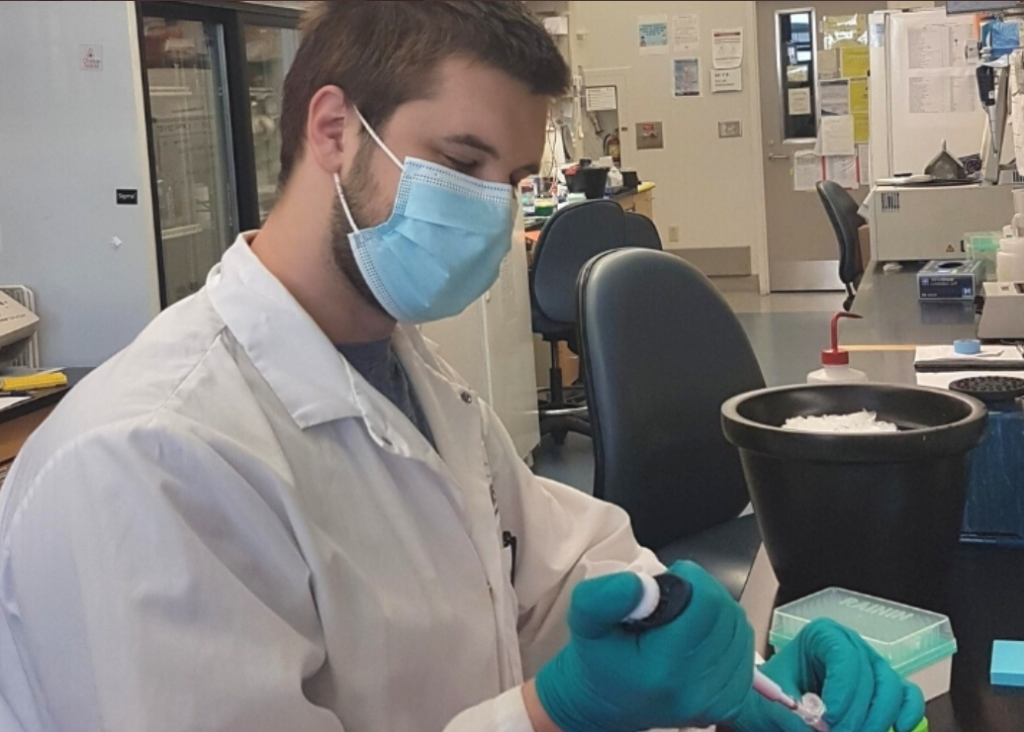- Please tell us a little bit about yourself.
My name is Liam Ratushny, and I am a 4th-year PhD candidate in the Department of Pathology & Laboratory Medicine at Western University. My research is co-supervised by Dr. Fred Dick and Dr. Chris Howlett. I hold an Honours BSc in Biomedical Toxicology from the University of Guelph. I aspire to become a career researcher and contribute to the mechanistic understanding and potential treatments of breast cancer.
- Why are you passionate about the work you are doing, and/or do you have a personal connection to breast cancer?
My connection to cancer research is a personal one, as a child I had a tumor discovered in one of my eyes. I underwent several surgeries and treatments over the years and experienced cancer research from a patient perspective. The collaborative work of researchers, oncologists and other healthcare workers facilitated the use of research to deliver the best possible patient care to me. It was the research and passion of those involved in my care and that helped limit the damage caused by my tumour. This experience, merged with my interest to better understand mechanisms of disease, is what fuels my passion to contribute meaningful research to the field of breast cancer research and give back to patients as the field once did for me.
- Why is the TBCRU Studentship Award important to you, and how does it advance your research?
I am incredibly grateful to have my research funded by the TBCRU Traineeship Program. Not only does this provide validation of my own research from prominent members of the breast cancer research community but additionally, the funds from this award allow us to dedicate more resources to my project and expand the experiments. This award also provides the opportunity to meet and exchange ideas with like-minded breast cancer researchers and fosters opportunities for collaboration.
- In a few lines, please describe your research project, including the main objective and what problem(s) you hope to solve.
Breast cancer, specifically the triple-negative breast cancer (TNBC) subtype, can have great variability in patient prognosis if there is spread (or metastasis) from the primary breast tumor to secondary organs elsewhere in the body. The breast cancer cells that spread may enter a state of dormancy in order to evade treatment and enhance their survival, leading to the development of secondary tumors. A specific group of proteins in the cell called the mammalian DREAM complex have been previously identified to be critical to the dormancy and survival of disseminated cancer cells. My research aims to investigate how the DREAM complex contributes to the metastatic capabilities of breast cancer and identify potential therapeutic targets that can re-sensitize dormant tumor cells to chemotherapy and limit secondary tumor formation.
- Have there been any changes to or any advancements in your research since your project began?
Yes, I have been able to optimize a detection system that will be able to detect relative levels of human DNA as a proxy for human breast cancer cells. This system will allow me to track levels of breast cancer cells, either those circulating in the blood as they spread to distant organs, or those that have already arrived and are establishing tumors in specific organs in our experimental models. These tools will allow us to better study DREAM inhibition and its impact on disseminated breast cancer cell survival. Additionally, we have expanded our pilot study and are currently analyzing the results from our latest round of animal experiments.
- Have you had an opportunity to present (or publish) your research to your peers or the broader research community? Was it at a national or international meeting or in some other way?
I had the opportunity to present my research at the 2022 Oncology Research and Education Day in London, Ontario to cancer researchers from across Southwestern Ontario.
- If you received feedback following your presentation, how has it helped you and your research?
I received valuable feedback from individuals working in both research and patient care on how my research can positively contribute to the current field. It was a great opportunity to exchange ideas with like-minded individuals and to see what other research is driving the field outside of my own.
- How will your research be applied in the clinic or in a real-world setting? How will patients benefit from the results of your work?
Through investigating DREAM function and its impact on metastases, we will be able to characterize the importance of DREAM in the metastatic spread of triple negative breast cancer. Investigating the impact of certain inhibitor treatments have on metastatic spread through its interactions with the DREAM complex will identify if there are any clinically available therapeutics that can be repurposed for limiting metastases in patients. These findings will potentially identify therapeutic targets that will enhance response to traditional chemotherapy and reduce the probability of breast cancer recurrence.
- Tell us about your involvement in the Breast Cancer Canada fundraising events (Raise More Challenge, One Billion Steps Challenge).
I have been an active participant in Breast Cancer Canada events over my years at graduate school including the One Billion Steps Challenge, the Mother’s Day Walk, and most recently the Raise More Challenge for Breast Cancer Awareness Month. Participating in these events with my colleagues is a great to give back to Breast Cancer Canada and the generous donors that support us and contribute to breast cancer research across the country.
- What are your hobbies? What are you currently reading, watching, or listening to outside of the lab?
Outside of the lab, I am an avid hockey fan, having been playing and watching hockey since I could walk. I also enjoy hiking and like to take advantage of London’s many parks and nature trails. I am a huge book lover with my favourite genres being science and/or military fiction.
Watch Liam Discuss His Research Here.




